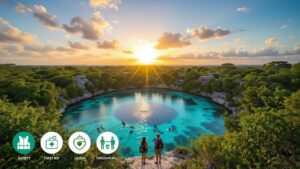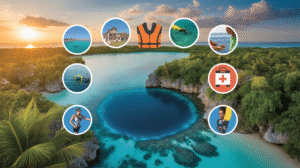Belize is recognized as a premier Caribbean destination, offering breathtaking landscapes and vibrant culture. However, it is essential for prospective travelers to find a balance between indulging in the stunning paradise that Belize represents and exercising necessary precautions to safeguard their well-being. This in-depth guide presents the latest crime statistics, government advisories, and firsthand insights to empower travelers with the knowledge required to explore Belize’s beautiful beaches, lush jungles, and magnificent ancient ruins while ensuring their safety remains a top priority.
1. Analyzing Crime Rates and Patterns in Belize for Better Travel Preparedness
As of 2024, Belize recorded a homicide rate of 21.7 per 100,000 inhabitants, reflecting a modest rise from the previous year’s figure of 21.5. Remarkably, there was a substantial reduction in homicide cases, decreasing by 29 percent during the first half of 2025 compared to the same period in 2024, with reported cases dropping from 58 to 41. According to the CompStat report from the Belize Police Department, there was a notable decrease in overall major crimes by 9 percent, falling from 536 in H1 2024 to 489 in H1 2025. This positive trend is largely due to significant drops in murder (–29 percent), robbery (–15 percent), and theft (–26 percent), indicating a favorable shift in safety for both locals and visitors.
| Crime Category | Jan–Jun 2024 | Jan–Jun 2025 | Change |
|---|---|---|---|
| Major crimes | 536 | 489 | –9 percent |
| Murders | 58 | 41 | –29 percent |
| Robbery | – | – | –15 percent |
| Theft | – | – | –26 percent |
2. Crucial Government Travel Advisories for Enjoying a Safe Trip to Belize
- U.S. Department of State: Presently, Belize is categorized as Level 2: Exercise Increased Caution due to the occurrence of violent crime, including sexual assault, home invasions, armed robberies, and murder. Specifically, the Southside of Belize City is rated as Level 3: Reconsider Travel, which suggests that travelers should avoid non-tourist areas located south of Haulover Creek. Source: U.S. Department of State
- Government of Canada: Travelers from Canada are advised to exercise a high degree of caution throughout Belize, with specific recommendations to avoid non-essential travel to Southside Belize City due to ongoing gang-related and drug-related violence. Source: Government of Canada
- UK FCDO: The UK Foreign, Commonwealth & Development Office cautions that Belize has one of the highest murder rates globally per capita, with serious gang-related violence primarily affecting the Southside of Belize City. Nevertheless, popular tourist destinations such as San Pedro, Caye Caulker, Placencia, and San Ignacio typically remain safe for travelers who exercise the appropriate level of caution. Source: UK Foreign, Commonwealth & Development Office
3. Recognizing High-Risk Areas and Common Criminal Activities in Belize
- Belize City (Southside): This region is infamous for gang-related activities that significantly contribute to elevated violent crime rates. It is advisable to steer clear of non-tourist neighborhoods, especially after dark, to prioritize personal safety.
- Border Zones: The areas surrounding the borders are experiencing heightened smuggling and cross-border violence, particularly involving Guatemala, which travelers should be cautious of.
- Petty Crime Hotspots: Locations such as San Pedro have gained notoriety for incidents of pickpocketing and credit card fraud. Always be vigilant about shielding your PIN when using ATMs, and prefer machines that are located inside banks for enhanced safety.
4. Proactive Measures for Ensuring Traveler Safety While Exploring Belize
Boosting Your Personal Security During Your Belize Adventure
- Stay alert: It’s vital to avoid walking alone at night, particularly in urban areas like Belize City and Belmopan, where crime risk is elevated.
- Protect your valuables: Always use hotel safes for storing important items and keep wallets and phones concealed to deter potential thieves.
- Beware of spiked drinks: Refrain from accepting food or beverages from strangers, as this could lead to hazardous situations.

Transportation Safety Tips for Navigating Belize’s Roadways
- Road Conditions: Be aware that many secondary roads in Belize are unpaved and poorly lit. It is advisable to travel only during daylight hours and to keep your fuel tank full before embarking on longer trips.
- Exercise Caution with Public Transport: Public buses often lack proper maintenance—it’s best to avoid them if you can. When utilizing licensed taxis, keep in mind that they are not regulated by meters; therefore, negotiate your fare in advance to prevent misunderstandings.
- Ferry Safety: When traveling between the cayes, ensure that life jackets are available and that the vessels are not overcrowded to guarantee safe passage.
Participating in Adventure Activities with Safety in Mind
- When engaging in adventure activities such as scuba diving, zip-lining, and cave tubing, always select reputable operators. Verify their safety records and equipment standards to ensure your safety; consider purchasing travel insurance that includes coverage for medical evacuation.
- Only swim in designated areas; riptides are frequent, and lifeguards may be scarce, making it critical to prioritize safety while in the water.
Crucial Health Precautions for Travelers to Belize
- Vaccination Suggestions: Although there is no entry requirement for yellow fever, it is strongly recommended to get vaccinated against hepatitis A, hepatitis B, typhoid, and rabies prior to traveling to Belize. For comprehensive details, refer to the CDC guidelines.
- Mosquito Protection Measures: Considering the year-round risk of diseases such as dengue, chikungunya, and Zika, using EPA-approved insect repellents, wearing long-sleeved clothing, and sleeping under mosquito nets is crucial to minimize exposure.
- Water Safety Guidelines: Adhere to the rule of “boil it, cook it, peel it, or leave it” for food and water safety. Carry oral rehydration salts to effectively manage traveler’s diarrhea and ensure you stay hydrated.
5. Special Considerations for Women, Children, and LGBTQ Travelers in Belize
- Women traveling alone should exercise heightened caution to avoid isolated areas and poorly lit alleys, as there have been reports of harassment in various regions.
- Members of the LGBTQ community may encounter social stigma in Belize; it is advisable to refrain from public displays of affection in order to maintain personal safety.
- Children traveling alone or with only one parent must have notarized parental consent letters, as immigration officials in Belize strictly enforce this regulation.

6. How to Access Emergency Services and Consular Support While in Belize
- In emergencies, always dial 911 for immediate assistance, whether you require medical, fire, or police services in Belize.
- The U.S. Embassy located in Belmopan and the Canadian Honorary Consul in Belize City can offer help with matters such as arrests, detention, or other emergencies. For further information, visit U.S. Embassy Belmopan.
- Be sure to enroll in your government’s traveler-registration program, like STEP for U.S. citizens or the Registration of Canadians Abroad for Canadians, to remain informed and receive necessary assistance.
Thorough Bibliography for Informed Travelers
- Belize Police Department’s CompStat report
- U.S. Department of State Belize Travel Advisory
- Government of Canada Travel Advice for Belize
- UK Foreign, Commonwealth & Development Office Advice
- CDC Traveller’s Health: Belize
- U.S. Embassy Belmopan
The Article Is Belize Safe to Visit? 2025 Complete Safety Guide for Smart Travelers appeared first on Belize Travel Guide
The Article Belize Safety Guide 2025: Essential Tips for Smart Travelers Was Found On https://limitsofstrategy.com


